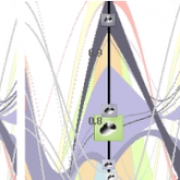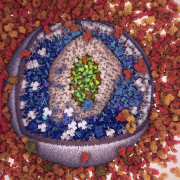In living systems, one molecule is commonly involved in several distinct physiological functions. The roles of molecules are commonly summarized in pathway diagrams, which, however, are abstract, hierarchically nested and thus is difficult to comprehend especially by non-expert audience. The primary goal of this research in visualization is to intuitively support the comprehensive understanding of relationships among biological networks using interactively computed illustrations. Illustrations, especially in textbooks of biology are carefully designed to clearly present reactions between organs as well as interactions within cells. Automatic generation of illustrative visualizations of biological networks is thus the technical content of this proposal. Automatic generation of hand-drawn illustrations has been a challenging task due to the difficulty of algorithmically describing a human creative process such as evaluating and selecting significant information and composing meaningful explanations in a visually plausible manner. The project also involves experts from several disciplines including network and medical visualization, data mining, systems biology as well as perceptual psychology. The result will provide a new direction for physiological process analysis and accelerate the knowledge transfer not only within experts but also to the public. Acknowledgment: The project has received funding from the European Union Horizon 2020 research and innovation programme under the Marie Sklodowska-Curie grant agreement No. 747985.
Funding
- Horizon 2020 Marie Sklodowska-Curie Actions (MSCA) 747985
Research Areas
- In this research area, our focus lies on novel visual encodings and interaction techniques to explore a large amount of abstract data, often in combination with analytical reasoning.
- In this research area, we develop new visualization techniques to support biologists in data analysis and create visualizations to disseminate scientific discoveries in biology.




 paper
paper video
video
 image
image paper
paper
 image
image paper
paper
 paper
paper

 image-full
image-full
 paper
paper
 paper
paper
 paper
paper
 paper
paper paper
paper
 paper
paper
 paper
paper paper
paper
 poster
poster
 paper
paper video
video
 paper
paper paper
paper